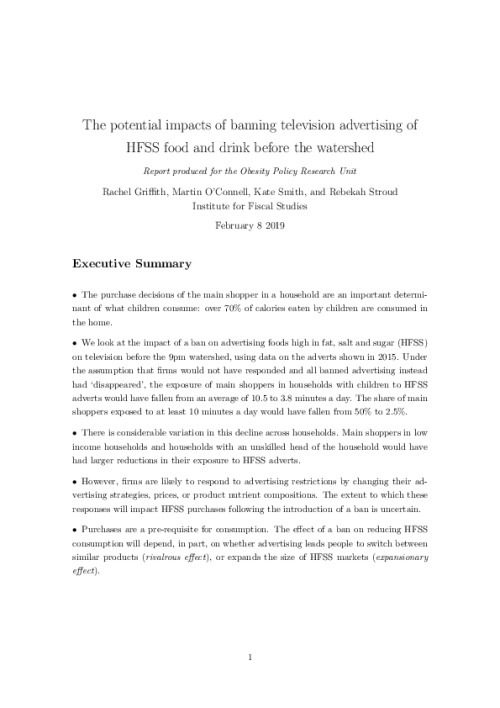Advertising of high fat, salt or sugar (HFSS) food and drink during children’s television programmes has been banned in the UK since 2007. The Government has recently announced that they will consult on further advertising restrictions for products high in fat, salt and sugar on TV.
The effects of further restrictions on health outcomes will depend on a number of factors: how exposure to advertising is affected, how firms respond in terms of prices, reformulation and other behaviours, how these changes affect the purchase and consumption decisions that households and individuals make, how all of this varies across individuals and how reductions in consumption affects health outcomes.
In this report we discuss the potential effects of banning all advertising of HFSS food and drink before the watershed and how this will depend on each of the channels mentioned above, highlighting where there is uncertainty about the magnitude of the effects.
Authors

CPP Co-Director, IFS Research Director
Rachel is Research Director and Professor at the University of Manchester. She was made a Dame for services to economic policy and education in 2021.

Research Fellow University of Wisconsin
Martin, previously Deputy Research Director, is a Research Fellow at IFS and Professor of Economics at the University of Wisconsin.

Research Fellow London School of Economics
Kate is an IFS Research Fellow and an Assistant Professor at LSE, interested in public finance, industrial organisation and applied microeconomics.

Rebekah Stroud
Report details
- Publisher
- The Obesity Policy Research Unit
Suggested citation
Griffith, R et al. (2019). The potential impacts of banning television advertising of HFSS food and drink before the watershed. London: The Obesity Policy Research Unit. Available at: https://ifs.org.uk/publications/potential-impacts-banning-television-advertising-hfss-food-and-drink-watershed (accessed: 2 May 2024).
Related documents
More from IFS
Understand this issue

Conservative Party Conference: Can the next government afford the NHS?

Disability, illness and pain are real problems for the entire economy
28 August 2023

Retirement is not always a choice that workers can afford to make
6 November 2023
Policy analysis

The past and future of NHS waiting lists in England
29 February 2024

Recent trends in and the outlook for health-related benefits
19 April 2024

4.2 million working-age people now claiming health-related benefits, could rise by 30% by the end of the decade
19 April 2024
Academic research

Longer-term impacts of the COVID-19 pandemic on the dietary purchasing choices of British households
4 April 2024

The consequences of miscarriage on parental investments
22 March 2024

The menopause "penalty"
18 March 2024
